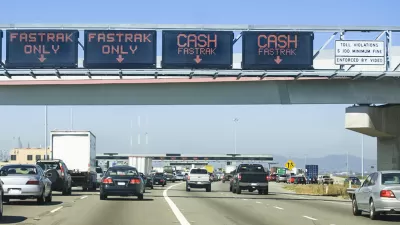Ryan Holeywell writes a follow-up to the meeting of a House Transportation subcommittee on the impending insolvency of the Highway Trust Fund - looking at it from the states' perspective rather than from Capitol Hill's. They have a lot at stake.
While some of the newer House members did not appear stirred by the dire consequences of the impending insolvency of the Highway Trust Fund as explained by Department of Transportation (DOT) under secretary Polly Trottenberg and Congressional Budget Office unit chief Kim Cawley on July 23, "it’s state transportation officials who should be worried", writes Holeywell.
If the trust fund experiences a cash shortfall, the DOT will be forced to start taking steps to manage whatever cash it has left. Trottenberg gave Congress a detailed look at what exactly that might mean for states -- and the situation isn't pretty.
Holeywell writes how the DOT pays for state projects when using federal funding. Rather than fronting them them the money, the "state departments of transportation enter agreements with the Federal Highway Administration (FHWA), award contracts to construction companies and then rely on getting payments from the feds in order to make payments to the contractors."
But if the trust fund gets too depleted, states will start getting reimbursed less and less frequently, perhaps as rarely as twice a month, Trottenberg warned. Even worse for states: If the situation gets bad enough, the feds might only be able to cover a portion of states’ reimbursement requests. If that happens, states could be forced to pull back on some projects.
How this impending repayment uncertainty to states will play out on Capitol Hill is yet to be seen. Two of the three options listed in Transportation Insolvency 101 for fixing the problem - raising the gas tax or transferring funds from the General Fund, would avert the problem altogether. While Congress is not known for planning in advance to avert financial crises, pressure from the states that legislators represent could be helpful to nudge them to act sooner than later.
FULL STORY: What a Depleted Highway Trust Fund Means for States

Trump Administration Could Effectively End Housing Voucher Program
Federal officials are eyeing major cuts to the Section 8 program that helps millions of low-income households pay rent.

Planetizen Federal Action Tracker
A weekly monitor of how Trump’s orders and actions are impacting planners and planning in America.

Ken Jennings Launches Transit Web Series
The Jeopardy champ wants you to ride public transit.

California Invests Additional $5M in Electric School Buses
The state wants to electrify all of its school bus fleets by 2035.

Austin Launches $2M Homelessness Prevention Fund
A new grant program from the city’s Homeless Strategy Office will fund rental assistance and supportive services.

Alabama School Forestry Initiative Brings Trees to Schoolyards
Trees can improve physical and mental health for students and commnity members.
Urban Design for Planners 1: Software Tools
This six-course series explores essential urban design concepts using open source software and equips planners with the tools they need to participate fully in the urban design process.
Planning for Universal Design
Learn the tools for implementing Universal Design in planning regulations.
Ada County Highway District
Clanton & Associates, Inc.
Jessamine County Fiscal Court
Institute for Housing and Urban Development Studies (IHS)
City of Grandview
Harvard GSD Executive Education
Toledo-Lucas County Plan Commissions
Salt Lake City
NYU Wagner Graduate School of Public Service





























